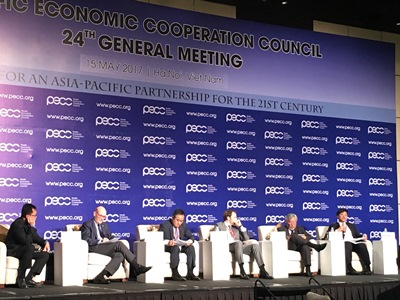 24th PECC General Meeting 'Vision for an Asia-Pacific Partnership' took place in Hanoi to coincide with a series of workshops and policy dialogues in the lead up to the APEC meeting for ministers responsible for trade (MRT).
24th PECC General Meeting 'Vision for an Asia-Pacific Partnership' took place in Hanoi to coincide with a series of workshops and policy dialogues in the lead up to the APEC meeting for ministers responsible for trade (MRT).
What are the key challenges and opportunities for the future of the Asia-Pacific partnership? Are current processes sufficient for dealing with the reality of deeper trade and integration in the region? What role should the region be playing in global leadership now and beyond 2020? How can the next phase of growth be made more inclusive, sustainable and innovative, taking into consideration digital revolution? These were some of the issues deliberated at the 24th PECC General Meeting (full program agenda with presentations for download) which drew about 150 guests including PECC members and local guests.
H.E. Pham Binh Minh, Deputy Prime Minister of Vietnam, in his opening remarks, shared his vision “to build a peaceful, dynamic, resilient, inclusive, comprehensively connected and integrated Asia-Pacific community, which gives equal access and opportunities for all.” He underscored that “major drivers should include structural reform, new technologies, especially digital advances, e-commerce, digital trade, quality human capital, competitive and innovative MSMEs, economic, financial, and social inclusion.” [download full speech]
Open trade can work but must be accompanied by public support for such openness with adequate social policies in order for economic growth to be sustainable in the ‘new world of trade,’ stressed Pascal Lamy, Chair of the French – Pacific Territories - committee for PECC and former Director General of the World Trade Organization (WTO). Another feature of the new world of trade is the growing importance of working with non-trade measurements (NTMs) in contrast to the ‘old world of trade’ where much of the focus was on lowering tariffs which will matter less and less. While international trade theory is still relevant, we need to do more to eliminate the differences in domestic regulations.
While free and open trade has contributed to alleviation of poverty and raising the standard of living throughout the Asia-Pacific region, we need to address the problem of inequality in the region.
“There is also emergence of a new digital divide in terms of access to these new services and hollowing out,” said Dr. Mari Elka Pangestu, co-chair of the Indonesian committee for PECC and former trade minister of Indonesia. She added that in order to reduce digital divide, there is the need to enable and facilitate utilization of digital tools and information through education that could heighten the digital literacy for all.
“As we approach the deadline for the Bogor Goals, APEC is at an inflection point, said Dr. Charles E. Morrison, former Co-chair of PECC and distinguished senior fellow at the East-West Center. He suggested that APEC develop a growth-oriented ‘Asia-Pacific Partnership (APP)’ to rebrand and “give primary emphasis to economic growth, jobs, equity, and sustainability dimensions: physical infrastructural development, human resource development, finance, innovation systems, SME opportunities.” Secondly, he said, we should bring “those voices into the regional cooperation that are not now heard enough to be true stakeholders.”
